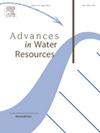Global sensitivity analysis of mass transfer and reaction dynamics for electrokinetic transport in porous media
IF 4
2区 环境科学与生态学
Q1 WATER RESOURCES
引用次数: 0
Abstract
Electrokinetic (EK) technologies are promising solutions for the remediation of contaminated sites, particularly in low-permeability porous media. However, their widespread adoption is hindered by the challenge of predicting the complex, coupled physico-chemical processes triggered by the application of external electric fields in the subsurface. Numerical models therefore represent essential tools to interpret system behavior. Uncertainties in experimental data, as well as in the formulation of conceptual models, still pose a challenge to develop robust predictive tools. In this context, our work addresses the impact of various sources of uncertainty on model-based predictions of EK transport in porous media. We employ Monte Carlo-based global sensitivity analyses (GSA) within both single-model (SM-GSA) and multi-model (MM-GSA). The multi-model approach relies on a theoretical framework encompassing different models capable of interpreting a set of EK transport scenarios. This allows us to address the impact of model formulation besides parametric uncertainty on mass transfer and reaction dynamics of EK transport. All candidate models in our set are based on a 2D dipole electrode configuration and each model incorporates a different combination of physico-chemical processes to explore different EK remediation scenarios dominated by electromigration or electroosmosis, for both conservative and reactive transport settings. We also investigate the influence of background electrolytes, charge interactions, reactant mobility and degradation reaction kinetics on system dynamics. To overcome the computational burden of process-based modeling and GSA implementations, we develop machine learning-based surrogate models. The latter are employed within both SM- and MM-GSA frameworks, using Sobol’ and AMAE sensitivity indices, respectively. This work provides a comprehensive quantification of how multiple sources of uncertainty impact electrokinetic transport behavior in porous media.
求助全文
约1分钟内获得全文
求助全文
来源期刊

Advances in Water Resources
环境科学-水资源
CiteScore
9.40
自引率
6.40%
发文量
171
审稿时长
36 days
期刊介绍:
Advances in Water Resources provides a forum for the presentation of fundamental scientific advances in the understanding of water resources systems. The scope of Advances in Water Resources includes any combination of theoretical, computational, and experimental approaches used to advance fundamental understanding of surface or subsurface water resources systems or the interaction of these systems with the atmosphere, geosphere, biosphere, and human societies. Manuscripts involving case studies that do not attempt to reach broader conclusions, research on engineering design, applied hydraulics, or water quality and treatment, as well as applications of existing knowledge that do not advance fundamental understanding of hydrological processes, are not appropriate for Advances in Water Resources.
Examples of appropriate topical areas that will be considered include the following:
• Surface and subsurface hydrology
• Hydrometeorology
• Environmental fluid dynamics
• Ecohydrology and ecohydrodynamics
• Multiphase transport phenomena in porous media
• Fluid flow and species transport and reaction processes
 求助内容:
求助内容: 应助结果提醒方式:
应助结果提醒方式:


